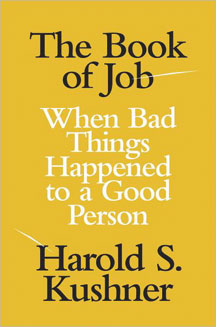“The Book Of Job: When Bad Things Happened To A Good Person” by Harold S. Kushner. (New York: Schocken) Also available in Nook and Kindle editions.
 “Human beings are meaning-makers. We want to be reassured that we live in a stable, orderly world.” It is this world view that inspired Rabbi Harold Kushner to express his theology in the widely popular “When Bad Things Happen to Good People,” reflecting his personal struggle to reconcile his theology with the tragically short life of his son, who suffered from a rare genetic disorder. Much of the theology expressed in that book was based on the Kabbalah of Isaac Luria and on the book of Job. In his latest book, “The Book of Job: When Bad Things Happened to a Good Person,” he returns to the latter with the goal of making this difficult book of the Bible accessible to the modern reader.
“Human beings are meaning-makers. We want to be reassured that we live in a stable, orderly world.” It is this world view that inspired Rabbi Harold Kushner to express his theology in the widely popular “When Bad Things Happen to Good People,” reflecting his personal struggle to reconcile his theology with the tragically short life of his son, who suffered from a rare genetic disorder. Much of the theology expressed in that book was based on the Kabbalah of Isaac Luria and on the book of Job. In his latest book, “The Book of Job: When Bad Things Happened to a Good Person,” he returns to the latter with the goal of making this difficult book of the Bible accessible to the modern reader.
Primarily Rabbi Kushner’s book consists of a chapter-by-chapter explication of the much-misunderstood biblical work. He is correct, I believe, in his assertion that Job is an adaptation of an old folk tale, in which the author “took the venerable, pious Fable of Job, turned it inside-out, and gave us the theological masterpiece we know as the book of Job in the Bible.” Unfortunately, people with a casual knowledge of the book know only the fable; how else would the phrase “the patience of Job” have become part of our language? The recent film “A Serious Man” was supposedly based on the story of Job, but it considers only the fable, not the actual thrust of the book as a whole. Kushner’s one omission is his lack of attention to the final chapter, which returns to the fable, providing a conventional happy ending. Personally I believe that the author did so with a wonderful sense of narrative irony, which many readers miss because we associate such irony with modern literature and not with works written thousands of years ago.
As Rabbi Kushner points out, all but three chapters of Job are an extended poem which to a great extent “leave the fable behind.” Satan’s wager with God is never referred to again. It seems that his assertion that “it makes far more sense to read the poem as a challenge to, and a rejection of, the theology of the fable” is the only way to look at Job. I especially liked his insight into the voice from the whirlwind episode: “Until now Job’s understanding of God has been strictly theological, based on what people had taught him, and he had problems reconciling those teachings with the facts of his life…. But now he has met God, and meeting God is very different from being taught about God…. Job has evolved from the realm of theology to that of religious experience, from discussing God to encountering God.”
My one disagreement with Rabbi Kushner’s approach is with his explication of Chapter 40, in which he writes “Behemoth is the Primal Life Force that gives people the energy to do things and to have an impact on the lives of other people for good or ill” and Leviathan is “the agent of chaos,” the force of natural law. This fits well with Kushner’s philosophy, that free will and natural law are essential components of the universe. Personally, I agree with this theology, but after re-reading Chapter 40 three times, I cannot see these views reflected there. In this instance, I believe that Rabbi Kushner has superimposed his own views onto the biblical text, creating a sort of modern Midrash. He is of course free to do so, but he should have made it clear that he has moved from objective interpretation to his personal theology.
Given this one caveat, nevertheless, I would recommend this book highly. More than any other book of ancient wisdom (with the possible exception of Kohelet/Ecclesiastes), the book of Job has the power to speak to serious people in the 21st century, and as far as I know, no one has explained it as clearly and directly as Rabbi Kushner has in this volume.


